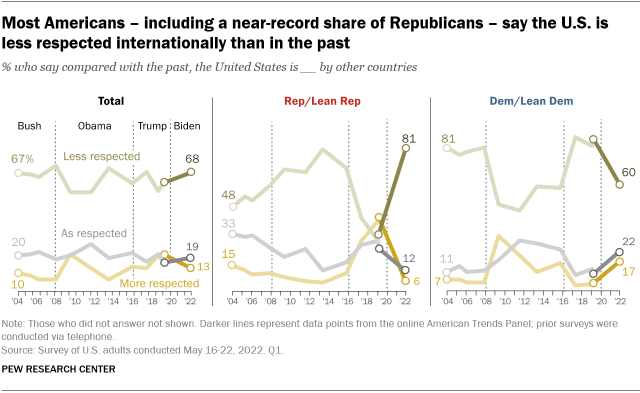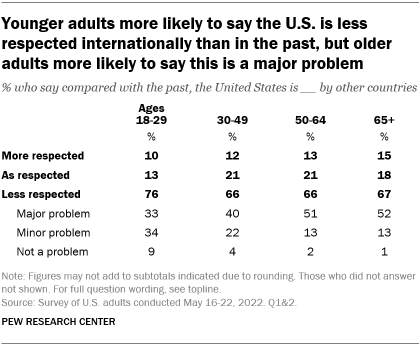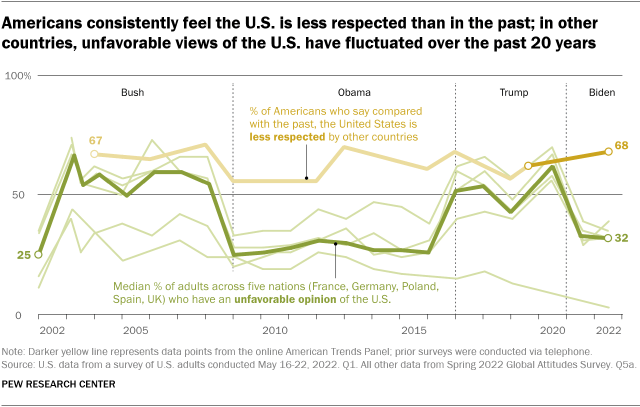Most Americans continue to think the U.S. is less respected today than in the past
While large majorities of Americans have consistently said their country is less respected than it was in the past, international attitudes toward the U.S. have fluctuated considerably
Pew Research Center
A majority of Americans have long held the view that the United States is less respected by other countries today than it was in the past, and around two-thirds of U.S. adults (68%) say that’s the case today, according to a new Pew Research Center survey. Only 13% think the U.S. garners more respect internationally now than in the past, while 19% think it’s as respected as ever.
But the consistency of overall U.S. public opinion on this question masks large swings among Republicans and Democrats. Around eight-in-ten Republicans and Republican-leaning independents (81%) currently believe the U.S. is less respected than in the past – among the highest GOP percentages measured in Center surveys dating back to 2004. This represents a shift of nearly 50 percentage points from the Trump era, when for the first time, Republicans were more likely to say the U.S. was more respected internationally than to say it was less respected.

How we did this
Currently, six-in-ten Democrats and Democratic-leaning independents say the U.S. is less respected than it was in the past. While this is far lower than the record share of Democrats who said the same during Donald Trump’s presidency, Democrats’ views on this question are slightly less positive than they were at the beginning of the Obama administration. In 2009 and 2012, half of Democrats or fewer felt the U.S. was less respected than in the past.

Among the 68% of Americans who say the U.S. is less respected by other countries than in the past, most think this is a major problem. Overall, 44% of Americans say the U.S. is less respected and that it is a major problem, while 20% say it is less respected and it is only a minor problem; 3% say the U.S. is less respected but think it is not a problem.
Partisan differences are also evident on this question. A majority of Republicans (62%) say the U.S. is less respected and that it is a major problem, while only about a third of Democrats who say the U.S. is less respected (32%) agree. For Republicans, ideology is an important factor: Seven-in-ten conservative Republicans say less respect for the U.S. is a major problem, compared with 46% of moderate and liberal Republicans.

Age plays a complicated role in the public’s attitudes about how respected the U.S. is now compared with the past. Adults ages 18 to 29 are more likely than those ages 65 and older to say the U.S. is less respected than in the past (76% vs. 67%). However, they are also far more likely to say that less respect for the U.S. is a minor problem or not a problem at all. Those 65 and older, in turn, are more likely than the youngest adults to say less respect for the U.S. is a major problem (52% vs. 33%).
How do international views compare with those of Americans?
While large majorities of Americans have consistently said their country is less respected than it was in the past, international attitudes toward the U.S. have fluctuated considerably, according to data from five European nations that the Center has regularly surveyed over the past two decades.
Across these five nations – France, Germany, Poland, Spain and the United Kingdom – the median percentage of adults with an unfavorable view of the U.S. has risen and fallen as different American administrations have come and gone. Unfavorable views of the U.S. were at their highest level during the George W. Bush presidency, when a median of 67% across these nations had negative views of the U.S.; they were at their lowest level during the early years of the Obama presidency, when a median of around a quarter of adults viewed the U.S. negatively.
A similar fluctuation is evident when it comes to confidence in the U.S. president. Few adults in these key allied nations had confidence in Trump during his presidency – and significantly more now have confidence in Biden – even as Americans consistently expressed the sense that the U.S. is less respected than in the past.






Déjanos tu comentario